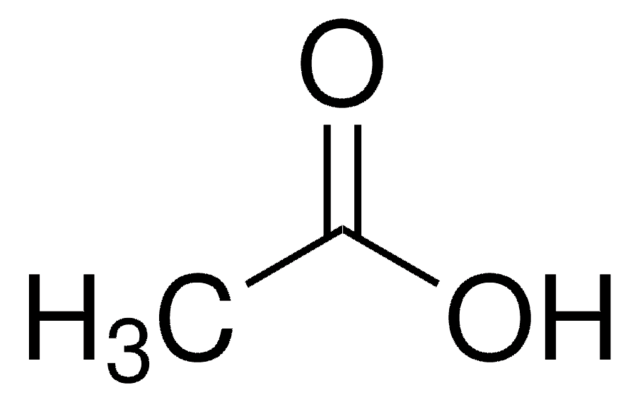27221
Acetic acid
glacial, puriss., 99-100%
Synonym(s):
Glacial acetic acid
About This Item
vapor density
2.07 (vs air)
Quality Level
grade
puriss.
assay
99-100%
form
liquid
autoignition temp.
800 °F
expl. lim.
16 %, 92 °F
4 %, 59 °F
technique(s)
mass spectrometry (MS): suitable
impurities
≤0.0005% heavy metals (as Pb)
≤0.005% non-volatile matter
refractive index
n20/D 1.371 (lit.)
pH
2.5 (20 °C, 50 g/L)
bp
117-118 °C (lit.)
mp
16.2 °C (lit.)
density
1.049 g/mL at 25 °C (lit.)
anion traces
chloride (Cl-): ≤5 mg/kg
sulfate (SO42-): ≤5 mg/kg
cation traces
Fe: ≤5 mg/kg
SMILES string
CC(O)=O
InChI
1S/C2H4O2/c1-2(3)4/h1H3,(H,3,4)
InChI key
QTBSBXVTEAMEQO-UHFFFAOYSA-N
Looking for similar products? Visit Product Comparison Guide
Related Categories
General description
Application
Other Notes
signalword
Danger
hcodes
Hazard Classifications
Eye Dam. 1 - Flam. Liq. 3 - Skin Corr. 1A
wgk_germany
WGK 1
Certificates of Analysis (COA)
Search for Certificates of Analysis (COA) by entering the products Lot/Batch Number. Lot and Batch Numbers can be found on a product’s label following the words ‘Lot’ or ‘Batch’.
Already Own This Product?
Find documentation for the products that you have recently purchased in the Document Library.
Customers Also Viewed
Our team of scientists has experience in all areas of research including Life Science, Material Science, Chemical Synthesis, Chromatography, Analytical and many others.
Contact Technical Service

